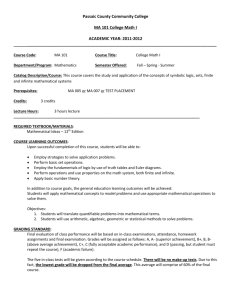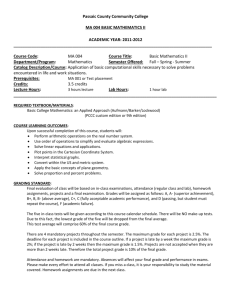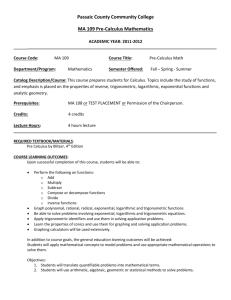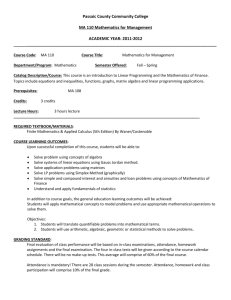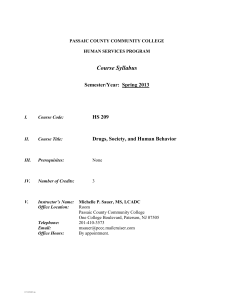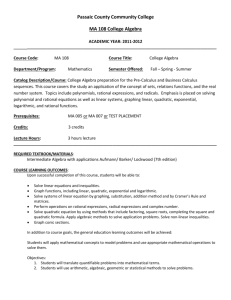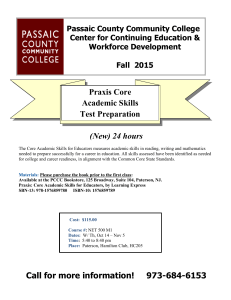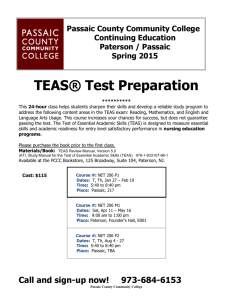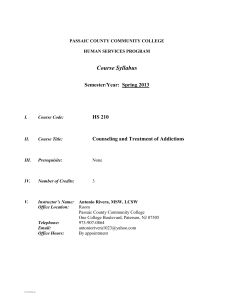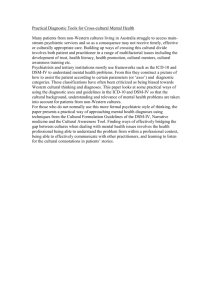Course Name: - Passaic County Community College
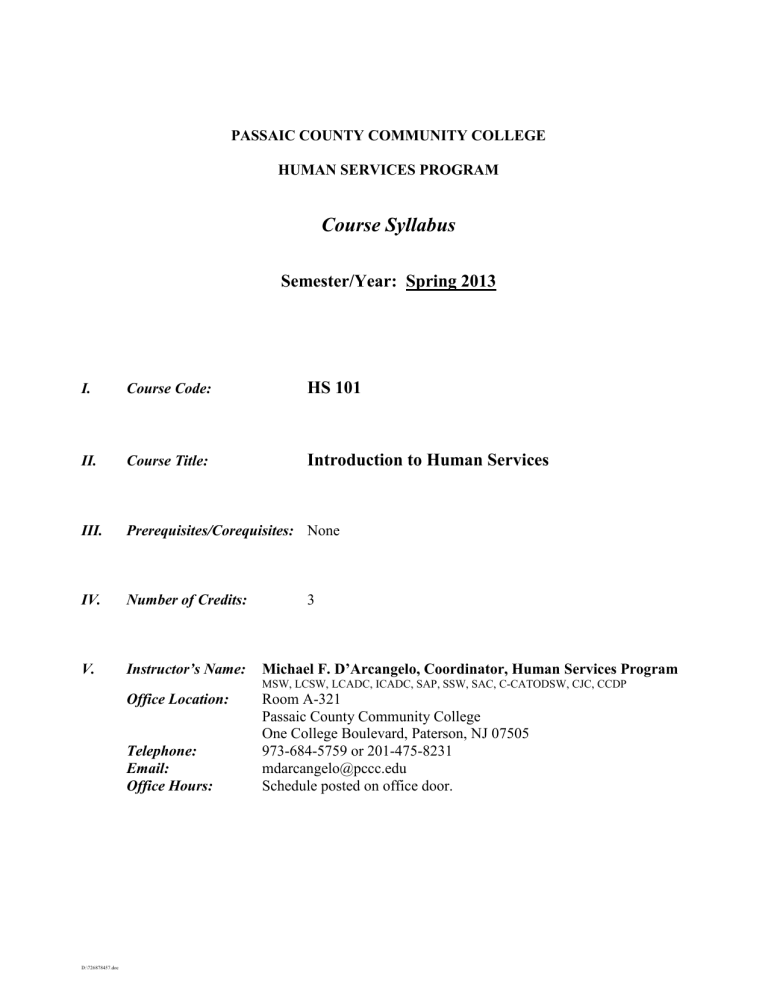
PASSAIC COUNTY COMMUNITY COLLEGE
HUMAN SERVICES PROGRAM
Course Syllabus
Semester/Year: Spring 2013
I. Course Code:
HS 101
II. Course Title:
Introduction to Human Services
III. Prerequisites/Corequisites: None
IV. Number of Credits: 3
V.
Instructor’s Name: Michael F. D’Arcangelo, Coordinator, Human Services Program
MSW, LCSW, LCADC, ICADC, SAP, SSW, SAC, C-CATODSW, CJC, CCDP
Office Location: Room A-321
Passaic County Community College
Telephone:
One College Boulevard, Paterson, NJ 07505
973-684-5759 or 201-475-8231
Email:
Office Hours: mdarcangelo@pccc.edu
Schedule posted on office door.
D:\726878457.doc
HS-101, Introduction to Human Services
Course Syllabus, continued
VI. Course Description:
This course is an introduction to human services as a profession. It provides the student with a global perspective of the customs and cultures of ethnic groups including, but not limited to, African-American, Asian, Caucasian, Hispanic/Latino
American, Middle Eastern. Special Populations, including persons with disabilities, sexual minorities, women, and youth, are examined. This course also reviews the historical development of social services and explores the societal values that served as the catalyst for the implementation of social services policies. Community services with an emphasis on cultural awareness are identified and explored. Legal and ethical issues are examined not only for information about ethical standards but also for internalizing how to define and process a variety of ethical dilemmas.
VII. Course Objective:
Upon completion of the course, the student will be able to:
1.
2.
3.
4.
5.
Define the historical development and social values related to social services
Understand the ethical, professional, and legal issues concerning the human services profession
Demonstrate empathy for ethnic groups that make up our diverse population
Identify community services and the population they serve
Present the appropriate decision for an ethical dilemma
VIII. Course Outline:
Week 1: Overview of course.
Week 2: Credentials, licensure, alcohol and drug certification; DSM-IV diagnoses; Treatment Plan
Week 3: History of human services; development of social services policies.
Week 4: History of human services; development of social services policies.
Week 5: History of human services; development of social services policies; read pages 417-446 Addressing Diverse Populations in Treatment for next week.
Week 6: Review pages 417-446.
Page 2
HS-101, Introduction to Human Services
Course Syllabus, continued
Week 7: Review pages 417-446.
Week 8: DSM-IV diagnoses; Treatment Plan; read pages 519-551 Ethics for next week.
Week 9: Review pages 519-551.
Week 10: Research Paper * due; review pages 519-551.
Week 11: Review pages 519-551 ; read pages 553-578 12-Step Information for
Counselors for next week.
Week 12: Review pages 553-578.
Week 13: TBA.
Week 14: TBA.
Week 15: Final Exam .
Throughout the semester, DVDs will be viewed during class. When a DVD is viewed in class, a handwritten Summary must be submitted at the end of that class. All DVD summaries must be submitted at the time of viewing. SUMMARIES WILL NOT BE
ACCEPTED AFTER THE VIEWING DATE.
DVD Summaries must include student’s name, date, and DVD title.
* Each student is required to write a Research Paper consisting of two (2) pages plus a
Reference page and a submission verification from www.eTutoring.org
; typed; 12point type; double spaced; stapled. The Research Paper must be submitted by the
10 th week of classes. PAPERS WILL NOT BE ACCEPTED AFTER THE DUE
DATE. The Paper will require research outside the course book. All four (4) topics are required. The topics are:
NJ Mental Health Services in Passaic County
NJ Child and Family Services in Passaic County
NJ Disability Services in Passaic County
NJ Employment Services in Passaic County
NOTE: You must submit your Research Paper to www.eTutoring.org before submitting the final paper which is due on the 10 th week of classes. PAPERS
WILL NOT BE ACCEPTED WITHOUT VERIFICATION OF SUBMISSION
Page 3
HS-101, Introduction to Human Services
Course Syllabus, continued
TO www.eTutoring.org. Do not wait until the last minute to submit to eTutoring.
Your submission verification from eTutoring.org counts for ten (10%) of your final grade. eTutoring.org
is an online writing lab where you can submit a draft of your paper to a tutor, ask for specific feedback, and receive your work back with a tutor’s response.
Go to the website at www.eTutoring.org and select Northeast eTutoring Consortium; select Passaic County Community College; enter your Campus Cruiser ID and the last six digits of your social security number.
WEBSITE CITATION INFORMATION: All Research Papers must include citation information. If you are citing a website, use the following format: a. b. c. d. e. f. complete URL (address) of the website title of the website name of the author (if available) date of creation or latest update (if available) name of any institution or organization sponsoring or associated with the website date you accessed this website
IX. Text(s), Journals, and Other Materials Used in the Course:
Required Text:
Scheel, K. (2009). The fundamentals of addiction counseling: a primer OR The fundamentals of counseling: a primer (6 th
ed.) Santa Fe, New Mexico:
Distance Learning Center, LLC.
Highly Recommended Text:
Diagnostic and Statistical Manual of Mental Disorders (DSM-IV) which is available in the PCCC Bookstore or at a link on the Human Services Program homepage.
Page 4
HS-101, Introduction to Human Services
Course Syllabus, continued
X. Methods of Evaluation:
A. Grade Determinants:
30%
25%
20%
15%
10%
Attendance
Research Paper
Final Exam
DVD Summaries eTutoring.org Verification
B. Course Grading:
A
A-
B+ 87-89
B
B-
C+ 77-79
C
D
F
95-100
90-94
84-86
80-83
70-76
60-69
Below 60
XI. Program Policies:
PLEASE NOTE:
This course consists of two components:
College credits toward your degree
Domain Certification Hours.
All students are required to attend all classes.
If you arrive late, it is YOUR RESPONSIBILITY to make sure you are marked “present”.
The Professor’s attendance records are the standard.
For students WORKING TOWARD DOMAIN CERTIFICATION HOURS, missed classes will result in a loss of Domain Certification Hours. Because The Certification
Board requires a specific number of hours, if you are late or absent, the class is cancelled, or the College is closed, the Domain Certification Hours must be made up.
Page 5
HS-101, Introduction to Human Services
Course Syllabus, continued
Domain Certification Hours may be made up by the handwritten submission of complete
DSM-IV diagnoses according to the following schedule (Professor will provide list):
First submission: 1 through 25.
Second submission: 26 through 50.
Third submission: 51 through 75.
Domain Certification Hours will NOT be issued if there is any outstanding responsibility.
If you fail the course, you cannot receive Domain Certification Hours.
Exams cannot be made up.
All Papers, Definitions, and Diagnoses MUST include (on the first page) student’s name, course name, course code, section number, semester, and year.
Do NOT submit papers, definitions, and diagnoses with a cover page; keep a copy of your paper.
Ten (10%) per cent will be deducted from final grade for not following directions.
Any student arriving late or leaving early will have one (1%) per cent deducted from their final grade OR can hand write and submit 20 definitions for each occurrence. Students arriving late by more than fifteen minutes or leaving early by more than fifteen minutes also will be required to hand write and submit one DSM-IV diagnosis for each additional five minutes.
Any student whose cell phone or other electronic device goes off in class will have final grade lowered by three (3%) per cent for the first occurrence and five (5%) per cent for each additional occurrence OR can hand write and submit 20 for each occurrence.
Do not disrupt the class by getting up to answer a cell phone or other electronic device or throw out garbage. Your final grade will be lowered by three (3%) per cent for the first occurrence and five (5%) per cent for each additional occurrence.
Checking your cell phone or other electronic device during class will lower your final grade by three (3%) per cent for the first occurrence and five (5%) per cent for each additional occurrence.
If you disrupt the class, you will be asked to leave and you will receive a “zero” for the day.
All Definitions and DSM-IV Diagnoses must be handwritten.
All Definitions and DSM-IV Diagnoses are due one week after the occurrence.
DEFINITIONS AND DIAGNOSES WILL NOT BE ACCEPTED AFTER THE DUE
DATE.
IF YOU ARE CAUGHT CHEATING, YOUR FINAL GRADE WILL BE “F”.
Page 6
HS-101, Introduction to Human Services
Course Syllabus, continued
XII. College Policies:
Please refer to the PCCC Student Handbook and PCCC Catalog for information regarding:
PCCC’s Academic Integrity Code
Student Conduct Code
Student Grade Appeal Process
Please refer to the PCCC Catalog for the catalog year listed on your degree audit for information regarding the Intensive Writing Requirements.
Panther Alert: The College will announce delayed openings, closings, and other emergency situations through the Panther Alert System. Students are encouraged to sign up for the Panther Alert Notification. Students can sign up once they log into their
Campus Cruiser Portal account through the PCCC website at www.pccc.edu.
Cell Phone Policy: Use of cellular telephones, audible pagers, or other forms of audible electronic devices in all academic learning environments (including but not limited to, laboratories, testing centers, classroom, library, learning centers, theater, and so forth) is prohibited unless previously approved by the instructor or other authorized administrator.
XIII. Notification for Students with Disabilities:
If you have a disability and believe you need accommodations in my classroom, call 973-684-
6395 to make an appointment, preferably within the first two weeks of classes for Fall/Spring semesters. If you require testing accommodations, you must remind me one week in advance of the test.
“It is not the problems we face that define us; it is how we choose to handle them.”
Author Unknown
Page 7
